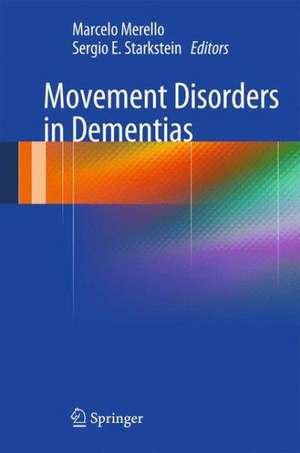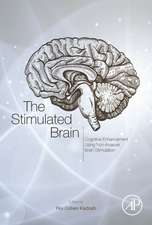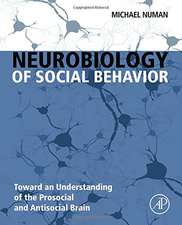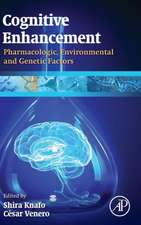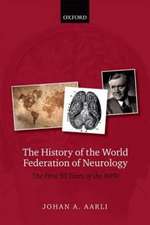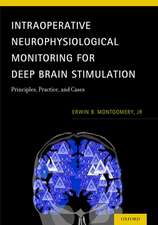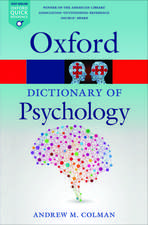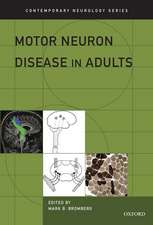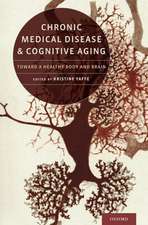Movement Disorders in Dementias
Editat de Marcelo Merello, Sergio E. Starksteinen Limba Engleză Hardback – apr 2014
In Movement Disorders in Dementias, movement disorder specialists from around the world write on topics generally restricted to dementia experts. Important motor issues related to either medication in demented patients (drug-induced movement disorders) or manifestations common to all forms of dementia, regardless of underlying cause (gait disorders, falls, fear of falling), is followed by analysis of the relationship between motor and cognitive symptoms, from their common pathogenesis to specific medical treatments.
Movement Disorders in Dementias is aimed at general neurologists, dementia specialists, movement disorders specialists, neuropsychologists and geriatricians.
| Toate formatele și edițiile | Preț | Express |
|---|---|---|
| Paperback (1) | 778.80 lei 6-8 săpt. | |
| SPRINGER LONDON – 23 aug 2016 | 778.80 lei 6-8 săpt. | |
| Hardback (1) | 1105.77 lei 6-8 săpt. | |
| SPRINGER LONDON – apr 2014 | 1105.77 lei 6-8 săpt. |
Preț: 1105.77 lei
Preț vechi: 1163.97 lei
-5% Nou
Puncte Express: 1659
Preț estimativ în valută:
211.59€ • 221.48$ • 176.11£
211.59€ • 221.48$ • 176.11£
Carte tipărită la comandă
Livrare economică 31 martie-14 aprilie
Preluare comenzi: 021 569.72.76
Specificații
ISBN-13: 9781447163640
ISBN-10: 1447163648
Pagini: 278
Ilustrații: XVI, 278 p. 20 illus., 11 illus. in color.
Dimensiuni: 155 x 235 x 17 mm
Greutate: 0.7 kg
Ediția:2014
Editura: SPRINGER LONDON
Colecția Springer
Locul publicării:London, United Kingdom
ISBN-10: 1447163648
Pagini: 278
Ilustrații: XVI, 278 p. 20 illus., 11 illus. in color.
Dimensiuni: 155 x 235 x 17 mm
Greutate: 0.7 kg
Ediția:2014
Editura: SPRINGER LONDON
Colecția Springer
Locul publicării:London, United Kingdom
Public țintă
Professional/practitionerCuprins
Neurodegenerative Disorders: Dementia and Parkinsonism, Lumping Together or Splitting Apart?.- Gait Disorders in Patients with Cognitive Impairment or Dementia.- Falls in Patients with Dementia.- Treatment of Parkinsonism in Patients with Non-Parkinson Dementia.- Psychiatric Complications of Alzheimer´s Disease overlapping with Parkinsonism: Depression, Apathy, Catatonia and Psychosis.- Drug-Induced Movement Disorders in Elderly Patients.- Scales for Measuring Parkinsonism in Demented Patients.- Movement Disorders in Alzheimer Disease.- Movement Disorders in Frontotemporal Dementia.- Dementia with Lewy Bodies.- Dementia in Parkinson's Disease and Atypical Parkinsonism.- Vascular Dementia and Parkinsonism.- Progressive Apraxia of Speech and Primary Progressive Aphasias.- Normal Pressure Hydrocephalus.- Movement Disorders in Infectious Dementias.
Notă biografică
Marcelo Merello MD PhD
Professor of Neurology Universidad Catolica Argentina. Director of Neuroscience Department Raul Carrea Institute for Neurological Research FLENI.
Clinical Researcher CONICET
Born in Argentina in 1961, Marcelo J. Merello graduated from the School of Medicine, Buenos Aires University in 1987, where he later took his PhD degree. He completed an internal medicine residence at CEMIC and then Neurology at FLENI both in Buenos Aires. He was a Research Fellow in neurology at the National Hospital for Nervous Diseases Queen Square and Research Registrar in Neurology at the Middlesex Hospital, both in London. Currently, he is head of the Movement Disorders Section at the Raul Carrea Institute for Neurological Research (FLENI) in Buenos Aires and Director of Neuroscience of the same institute and currently teaching at the University of Buenos Aires and as Professor of Neurology at the Pontificia Universidad Catolica Argentina (UCA). He is also Clinical Researcher of the CONICET Argentina.
He has co-authored over 120 papers in leading peer reviewed journals in the field, more than 200 abstracts presentations on Parkinson’s disease, dystonia, and other movement disorders in international congresses and he has written more than 20 book chapters. He wrote / co-edited six books. He was member of the editorial Board of Movements Disorders Journal, and is currently co-editor in chief of Movement Disorders Clinical Practice journal.
Sergio E. Starkstein MD PhD
Professor of Psychiatry, School of Psychiatry and Clinical Neurosciences, University of Western Australia.
Born in Argentina in 1957, Sergio E. Starkstein graduated from the School of Medicine, Buenos Aires University in 1981, where he later took his PhD degree in neuropsychiatry. He completed an internal medicine residence at CEMIC and then Neurology and Psychiatry at FLENI both in Buenos Aires. He was Assistant Professor at theDepartments of Psychiatry, at The Johns Hopkins University and the University of Iowa, both in the U.S.A. Currently he is head of the Neuropsychiatry Unit at the School of Psychiatry and Clinical Neurosciences, University of Western Australia, and head of the Psychiatry Consultation-Liaison Service at Fremantle Hospital, Western Australia.
He has co-authored over 240 papers in leading peer review journals in the field, more than 200 abstracts presentations on neuropsychiatric disorders in international meetings and has written more than 50 book chapters. He wrote / co-edited three books, and has a BA (Hons) degree in Philosophy (University of Western Australia).
Professor of Neurology Universidad Catolica Argentina. Director of Neuroscience Department Raul Carrea Institute for Neurological Research FLENI.
Clinical Researcher CONICET
Born in Argentina in 1961, Marcelo J. Merello graduated from the School of Medicine, Buenos Aires University in 1987, where he later took his PhD degree. He completed an internal medicine residence at CEMIC and then Neurology at FLENI both in Buenos Aires. He was a Research Fellow in neurology at the National Hospital for Nervous Diseases Queen Square and Research Registrar in Neurology at the Middlesex Hospital, both in London. Currently, he is head of the Movement Disorders Section at the Raul Carrea Institute for Neurological Research (FLENI) in Buenos Aires and Director of Neuroscience of the same institute and currently teaching at the University of Buenos Aires and as Professor of Neurology at the Pontificia Universidad Catolica Argentina (UCA). He is also Clinical Researcher of the CONICET Argentina.
He has co-authored over 120 papers in leading peer reviewed journals in the field, more than 200 abstracts presentations on Parkinson’s disease, dystonia, and other movement disorders in international congresses and he has written more than 20 book chapters. He wrote / co-edited six books. He was member of the editorial Board of Movements Disorders Journal, and is currently co-editor in chief of Movement Disorders Clinical Practice journal.
Sergio E. Starkstein MD PhD
Professor of Psychiatry, School of Psychiatry and Clinical Neurosciences, University of Western Australia.
Born in Argentina in 1957, Sergio E. Starkstein graduated from the School of Medicine, Buenos Aires University in 1981, where he later took his PhD degree in neuropsychiatry. He completed an internal medicine residence at CEMIC and then Neurology and Psychiatry at FLENI both in Buenos Aires. He was Assistant Professor at theDepartments of Psychiatry, at The Johns Hopkins University and the University of Iowa, both in the U.S.A. Currently he is head of the Neuropsychiatry Unit at the School of Psychiatry and Clinical Neurosciences, University of Western Australia, and head of the Psychiatry Consultation-Liaison Service at Fremantle Hospital, Western Australia.
He has co-authored over 240 papers in leading peer review journals in the field, more than 200 abstracts presentations on neuropsychiatric disorders in international meetings and has written more than 50 book chapters. He wrote / co-edited three books, and has a BA (Hons) degree in Philosophy (University of Western Australia).
Textul de pe ultima copertă
This book focuses on extrapyramidal signs and symptoms of all types of dementia, and addresses the issue of the artificial boundary between dementias and Parkinsonism, which represent the two most common symptoms found in degenerative central nervous system diseases.
In Movement Disorders in Dementias, movement disorder specialists from around the world write on topics generally restricted to dementia experts. Important motor issues related to either medication in demented patients (drug-induced movement disorders) or manifestations common to all forms of dementia, regardless of underlying cause (gait disorders, falls, fear of falling), is followed by analysis of the relationship between motor and cognitive symptoms, from their common pathogenesis to specific medical treatments.
Movement Disorders in Dementias is aimed at general neurologists, dementia specialists, movement disorders specialists, neuropsychologists and geriatricians.
In Movement Disorders in Dementias, movement disorder specialists from around the world write on topics generally restricted to dementia experts. Important motor issues related to either medication in demented patients (drug-induced movement disorders) or manifestations common to all forms of dementia, regardless of underlying cause (gait disorders, falls, fear of falling), is followed by analysis of the relationship between motor and cognitive symptoms, from their common pathogenesis to specific medical treatments.
Movement Disorders in Dementias is aimed at general neurologists, dementia specialists, movement disorders specialists, neuropsychologists and geriatricians.
Caracteristici
Describes motor manifestations common to all forms of dementia regardless of underlying cause Describes important motor issues related to medication in demented patients Details the relationship between motor and cognitive symptoms, from pathogenesis to medical treatments
